英语作文复习资料
如何有效复习所学的英语知识英语作文
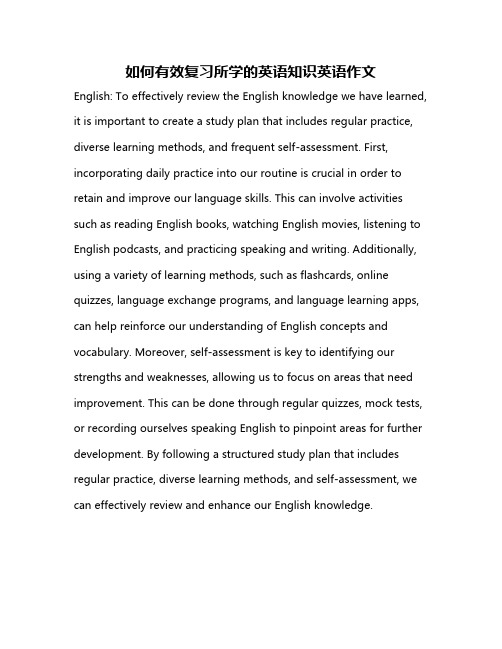
如何有效复习所学的英语知识英语作文English: To effectively review the English knowledge we have learned, it is important to create a study plan that includes regular practice, diverse learning methods, and frequent self-assessment. First, incorporating daily practice into our routine is crucial in order to retain and improve our language skills. This can involve activities such as reading English books, watching English movies, listening to English podcasts, and practicing speaking and writing. Additionally, using a variety of learning methods, such as flashcards, online quizzes, language exchange programs, and language learning apps, can help reinforce our understanding of English concepts and vocabulary. Moreover, self-assessment is key to identifying our strengths and weaknesses, allowing us to focus on areas that need improvement. This can be done through regular quizzes, mock tests, or recording ourselves speaking English to pinpoint areas for further development. By following a structured study plan that includes regular practice, diverse learning methods, and self-assessment, we can effectively review and enhance our English knowledge.中文翻译: 为了有效复习我们所学的英语知识,重要的是制定一个学习计划,其中包括定期练习、多样化的学习方法和频繁的自我评估。
读后续写语料库汇总清单-2024届高考英语作文复习专项
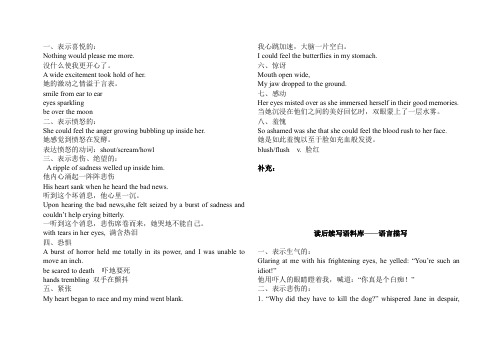
一、表示喜悦的:Nothing would please me more.没什么使我更开心了。
A wide excitement took hold of her.她的激动之情溢于言表。
smile from ear to eareyes sparklingbe over the moon二、表示愤怒的:She could feel the anger growing bubbling up inside her.她感觉到愤怒在发酵。
表达愤怒的动词:shout/scream/howl三、表示悲伤、绝望的:A ripple of sadness welled up inside him.他内心涌起一阵阵悲伤His heart sank when he heard the bad news.听到这个坏消息,他心里一沉。
Upon hearing the bad news,she felt seized by a burst of sadness and couldn’t help crying bitterly.一听到这个消息,悲伤席卷而来,她哭地不能自己。
with tears in her eyes, 满含热泪四、恐惧A burst of horror held me totally in its power, and I was unable to move an inch.be scared to death 吓地要死hands trembling 双手在颤抖五、紧张My heart began to race and my mind went blank.我心跳加速,大脑一片空白。
I could feel the butterflies in my stomach.六、惊讶Mouth open wide,My jaw dropped to the ground.七、感动Her eyes misted over as she immersed herself in their good memories.当她沉浸在他们之间的美好回忆时,双眼蒙上了一层水雾。
高考英语作文专题复习:11种常见英语作文类型及范文
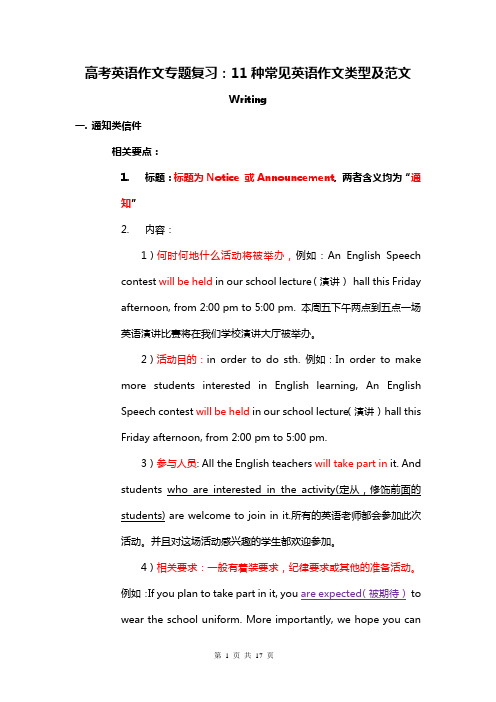
高考英语作文专题复习:11种常见英语作文类型及范文Writing一.通知类信件相关要点:1.标题:标题为Notice 或Announcement, 两者含义均为“通知”2.内容:1)何时何地什么活动将被举办,例如:An English Speech contest will be held in our school lecture(演讲)hall this Fridayafternoon, from 2:00 pm to 5:00 pm. 本周五下午两点到五点一场英语演讲比赛将在我们学校演讲大厅被举办。
2)活动目的:in order to do sth. 例如:In order to make more students interested in English learning, An EnglishSpeech contest will be held in our school lecture(演讲)hall thisFriday afternoon, from 2:00 pm to 5:00 pm.3)参与人员: All the English teachers will take part in it. And students who are interested in the activity(定从,修饰前面的students) are welcome to join in it.所有的英语老师都会参加此次活动。
并且对这场活动感兴趣的学生都欢迎参加。
4)相关要求:一般有着装要求,纪律要求或其他的准备活动。
例如:If you plan to take part in it, you are expected(被期待)towear the school uniform. More importantly, we hope you canbehave yourself(举止得体)and help us create a goodenvironment.如果你计划参加此次活动,我们期待你能穿校服。
中考英语作文怎么复习
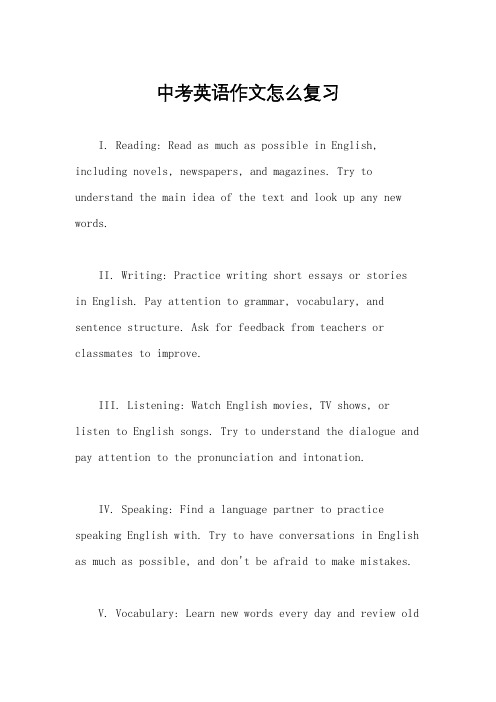
中考英语作文怎么复习I. Reading: Read as much as possible in English, including novels, newspapers, and magazines. Try to understand the main idea of the text and look up any new words.II. Writing: Practice writing short essays or storiesin English. Pay attention to grammar, vocabulary, and sentence structure. Ask for feedback from teachers or classmates to improve.III. Listening: Watch English movies, TV shows, or listen to English songs. Try to understand the dialogue and pay attention to the pronunciation and intonation.IV. Speaking: Find a language partner to practice speaking English with. Try to have conversations in English as much as possible, and don't be afraid to make mistakes.V. Vocabulary: Learn new words every day and review oldones. Use flashcards or vocabulary apps to help memorize and practice using them in sentences.VI. Grammar: Review the basic grammar rules andpractice using them in sentences. Pay attention to verb tenses, prepositions, and articles.VII. Test practice: Take practice tests to familiarize yourself with the format and types of questions. Time yourself to improve your speed and accuracy.VIII. Relax: Don't stress too much about the exam. Take breaks and relax to avoid burnout. Stay positive and confident in your abilities.。
英语作文关于如何复习所学过的知识
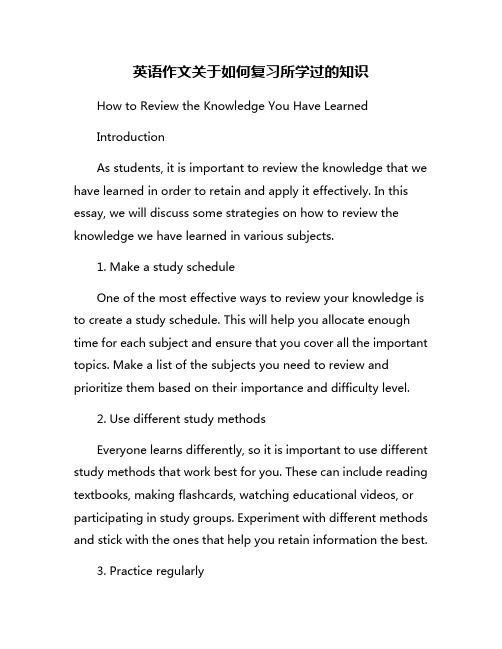
英语作文关于如何复习所学过的知识How to Review the Knowledge You Have LearnedIntroductionAs students, it is important to review the knowledge that we have learned in order to retain and apply it effectively. In this essay, we will discuss some strategies on how to review the knowledge we have learned in various subjects.1. Make a study scheduleOne of the most effective ways to review your knowledge is to create a study schedule. This will help you allocate enough time for each subject and ensure that you cover all the important topics. Make a list of the subjects you need to review and prioritize them based on their importance and difficulty level.2. Use different study methodsEveryone learns differently, so it is important to use different study methods that work best for you. These can include reading textbooks, making flashcards, watching educational videos, or participating in study groups. Experiment with different methods and stick with the ones that help you retain information the best.3. Practice regularlyRepetition is key when it comes to reviewing knowledge. Set aside time each day to practice what you have learned, whether it’s solving math problems, writing essays, or memorizing vocabulary. Regular practice will help reinforce your understanding and prevent you from forgetting important concepts.4. Test yourselfAnother effective way to review your knowledge is to test yourself regularly. Use past exam papers, online quizzes, or create your own practice tests to assess your understanding of the material. Testing yourself will help identify areas where you need to focus more and improve your retention of information.5. Seek feedbackIt can be helpful to seek feedback from teachers, classmates, or tutors when reviewing your knowledge. They can provide insight on your strengths and weaknesses, offer clarification on difficult concepts, and suggest additional resources for further study. Feedback is valuable in helping you improve your understanding and make the most out of your review.ConclusionIn conclusion, reviewing the knowledge you have learned is essential for academic success and personal growth. By creating a study schedule, using different study methods, practicing regularly, testing yourself, and seeking feedback, you can effectively review your knowledge and retain it for the long term. Remember that reviewing is a continuous process, so make it a habit to regularly review what you have learned to stay on top of your studies.。
二模英语作文复习
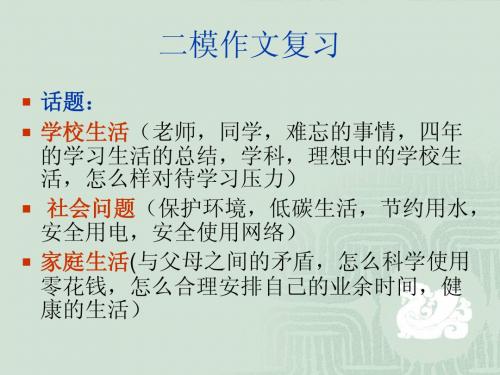
话题:
学校生活(老师,同学,难忘的事情,四年
的学习生活的总结,学科,理想中的学校生 活,怎么样对待学习压力) 社会问题(保护环境,低碳生活,节约用水, 安全用电,安全使用网络) 家庭生活(与父母之间的矛盾,怎么科学使用 零花钱,怎么合理安排自己的业余时间,健 康的生活)
题材(记叙文)
二模作文复习
命题作文 My views on using the 半命题作文 ______ has helped me
Internet(议论文) 图表作文 保护环境 低碳生活 健康生活方式
to learn a lot On the way to … A suggestion to my ___ teacher
说明文(图表)
现在的中学生每月都有一定数量的零花钱。
某校对九年级(1)班的30名学生进行了零花 钱用途的调查。结果如下:有的同学常买零 食或书籍,有的同学把钱花在手机或其他方 面,也有的同学把零花钱存了起来。请你任 选图表2至3项简述调查结果,谈谈你是如何支 配零花钱的,并说明理由.
Nowadays, most middle school students have pocket money every month, and we did a survey in Class 1, Grade 9. As the result shows, among the thirty students taking part in the survey, most of them often buy snacks and about a half spend their pocket money on books, but a few save some of it. However, I spend my pocket money differently. I usually spend most of the money buying good and educational books which can make me more knowledgeable. Only a small part is spent on snacks as most of the snacks are because I know they in fact unhealthy for us. And I save the rest against a rainy day. It is true that we have more and more pocket money now and we must make good use of it becaue are growing up
高三英语作文素材精选8篇
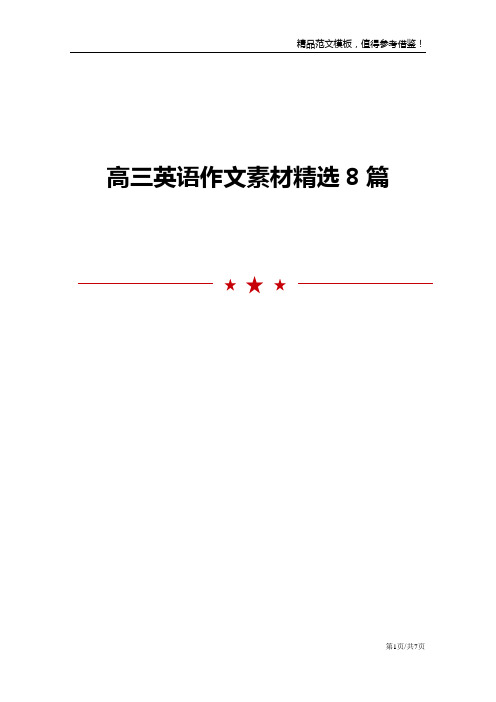
高三英语作文素材精选8篇高三英语作文素材精选8篇在最后的复习阶段,英语作文会成为高考英语复习的一个重点,下面整理了一些高三英语作文素材,供大家参考!英语作文素材1.Mrs Wilson ,I’m going out shopping , and won’t be back until about 5:00 pm. I have taken with me the two books you asked me to return to the city library . At about 1 o’clock this afternoon , Tracy called ,saying that she couldn’t meet you at Bolton Coffee tomorrow morning as she has something important to attend to . She felt very sorry about that , but said that you could set some other time for the meeting . She wanted you to call her back as soon as you are home . She has already told Susan about this change.LI Hua2.Good morning , ladies and gentlemen ,Some of us are having problems with our parents , as they often look into our school bags or read our diaries . I fully understand why we are not comfortable about it , but there’s no need to feel too sad. Our parents are checkingour bags or diaries to make sure we are not getting into any trouble . They have probably heard some horrible stories about other kids and thought we might do the same . Or perhaps they just want to connect with us but are doing it all wrong . My suggestion is : Tell them we want them to trust us as much as we’d like to trust them .If you don’t think you can talk to them , write them a letter and leave it lying around ---they are bound to read it .Thank you!3.My approach to difficulties in learningAs school students , we run into one difficulty after another in the process of learning . Everyone has their own ways to deal with them . Here I would like to share mine.When I am faced with a difficulty , I usually choose to refer to relevant learning materials or web pages . In this way , I can not only work it out but also improve my ability to overcome problems all by myself .However , when it is something beyond my competence , I turn to my classmates or teachers for help . Sometimes I also ask my parents for advice . As a result , I have made steady progress in my studies .高三英语作文范文1.Hi, TigerMom ,。
关于如何复习的英语作文
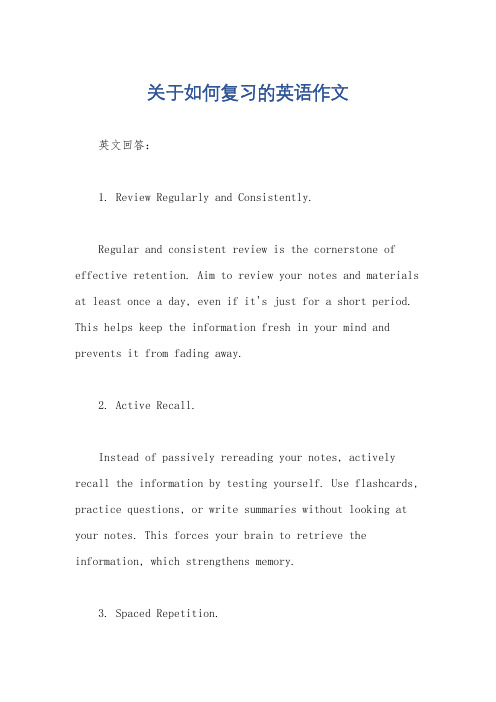
关于如何复习的英语作文英文回答:1. Review Regularly and Consistently.Regular and consistent review is the cornerstone of effective retention. Aim to review your notes and materials at least once a day, even if it's just for a short period. This helps keep the information fresh in your mind and prevents it from fading away.2. Active Recall.Instead of passively rereading your notes, actively recall the information by testing yourself. Use flashcards, practice questions, or write summaries without looking at your notes. This forces your brain to retrieve the information, which strengthens memory.3. Spaced Repetition.Reviewing at spaced intervals is more effective than cramming at one time. Start with short intervals (e.g., 10 minutes) and gradually increase the time between reviews (e.g., 1 hour, 1 day, 1 week). This helps consolidate information in your long-term memory.4. Interleaving.Mix up different subjects or topics when reviewing to avoid boredom and improve retention. Interleaving forces your brain to discriminate between different concepts, which enhances understanding and recall.5. Visual Cues.Use visual cues to enhance memory, such as diagrams, charts, graphs, and images. Visuals help create mental associations that make information easier to remember.6. Elaboration.Connect new information to what you already know to make it more meaningful. Elaborate by creating examples, stories, or analogies that illustrate the concepts.7. Retrieval Practice.Regularly practice retrieving information from memory without looking at your notes. This could involve answering questions, solving problems, or explaining concepts to someone else. Retrieval practice strengthens memory and improves your ability to apply information.8. Mind Mapping.Create mind maps to organize and visualize information. Mind maps connect concepts visually, which improves comprehension and retention.9. Teach Others.Teaching others is an excellent way to reinforce your own learning. Explain concepts to a friend, family member,or study group. This forces you to articulate your understanding and deepen your knowledge.10. Chunking.Break down large amounts of information into smaller, manageable chunks. Chunking helps prevent cognitive overload and makes information easier to process and remember.中文回答:1. 定期复习。
复习上节课内容的英语作文
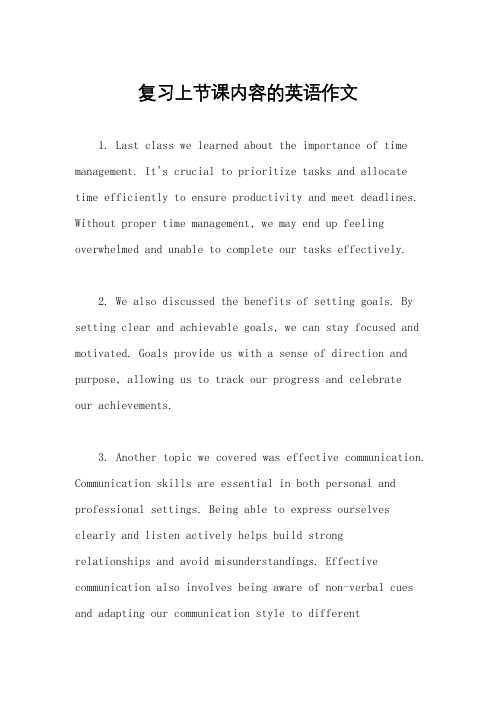
复习上节课内容的英语作文1. Last class we learned about the importance of time management. It's crucial to prioritize tasks and allocate time efficiently to ensure productivity and meet deadlines. Without proper time management, we may end up feeling overwhelmed and unable to complete our tasks effectively.2. We also discussed the benefits of setting goals. By setting clear and achievable goals, we can stay focused and motivated. Goals provide us with a sense of direction and purpose, allowing us to track our progress and celebrateour achievements.3. Another topic we covered was effective communication. Communication skills are essential in both personal and professional settings. Being able to express ourselves clearly and listen actively helps build strongrelationships and avoid misunderstandings. Effective communication also involves being aware of non-verbal cues and adapting our communication style to differentsituations.4. We touched upon the importance of self-care as well. Taking care of ourselves physically, mentally, and emotionally is crucial for overall well-being. It's important to find time for activities we enjoy, practice self-reflection, and manage stress effectively. By prioritizing self-care, we can maintain a healthy work-life balance and prevent burnout.5. Lastly, we discussed the concept of continuous learning. In today's fast-paced world, it's important to keep learning and adapting to new challenges. By seeking out opportunities for growth and development, we can stay relevant and enhance our skills and knowledge. Continuous learning also fosters creativity and innovation, allowing us to approach problems from different perspectives.Overall, the last class provided valuable insights into time management, goal setting, effective communication,self-care, and continuous learning. Applying theseprinciples in our daily lives can help us become more productive, fulfilled, and successful individuals.。
关于有效复习所学英语知识的英语作文
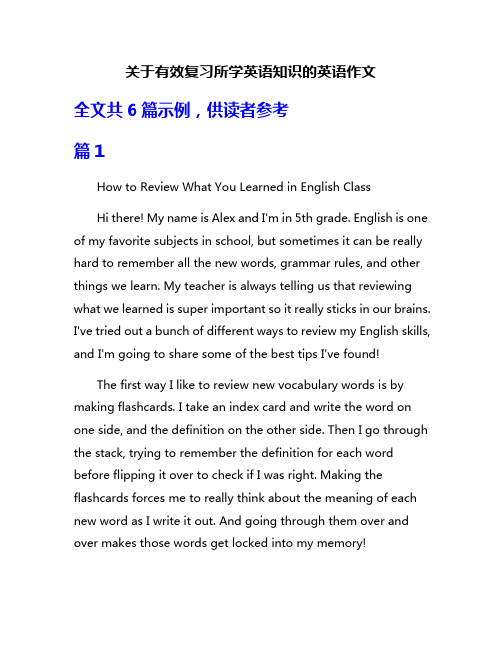
关于有效复习所学英语知识的英语作文全文共6篇示例,供读者参考篇1How to Review What You Learned in English ClassHi there! My name is Alex and I'm in 5th grade. English is one of my favorite subjects in school, but sometimes it can be really hard to remember all the new words, grammar rules, and other things we learn. My teacher is always telling us that reviewing what we learned is super important so it really sticks in our brains. I've tried out a bunch of different ways to review my English skills, and I'm going to share some of the best tips I've found!The first way I like to review new vocabulary words is by making flashcards. I take an index card and write the word on one side, and the definition on the other side. Then I go through the stack, trying to remember the definition for each word before flipping it over to check if I was right. Making the flashcards forces me to really think about the meaning of each new word as I write it out. And going through them over and over makes those words get locked into my memory!Another really fun way to review vocabulary is by playing games. There are a lot of different vocabulary games you can play online, on apps, or even just make up yourself. One game I like is having someone read me a definition, and I have to guess what word it is. Or you can take turns coming up with goofy sentences using the new words. The sillier the sentence, the more you'll remember it! Making review into a game makes it way more fun than just sitting and memorizing lists of words.For practicing things like verb tenses, sentence structure, and other grammar concepts, I really like making colorful posters or charts to hang up around my room. I'll write out the grammar rule in my own words, and add lots of examples. Having those visuals around me helps cement those ideas into my brain. Anytime I get stuck on that grammar rule later, I can just look around my room to find the reminder. My room is basically a gallery of all the English concepts I've learned!Speaking of visuals, another super helpful technique is to draw picture associations for words or ideas you're trying to learn. For example, if I'm trying to remember the word "yacht," I might draw a little boat with a bunch of fancy decorations. Or for remembering the concept of "alliteration," I could draw a bunch of apples all aligning together. Getting creative and makingthose visual connections makes it way easier for things to stick in my mind.One of my favorite ways to review is to simply talk about what I've learned, either to myself or to someone else. I'll pretend I'm the teacher explaining a new concept to a classroom. Or I'll grab my parents or siblings and go through vocabulary words, having them quiz me. Using your voice and saying things out loud is a great way to reinforce those language skills you just picked up. It's almost like you're practicing using the new knowledge in a real conversation.Of course, sometimes good old-fashioned repetition and practice is the way to go for really drilling things into your brain. When I need to master something like spelling rules or grammar conventions, I just make sure to do a ton of practice problems or examples over and over again. Writing out sentences using the new skills, filling out worksheets, you name it. It can be a little tedious, but that repeated practice really does make a huge difference in remembering.Another method I've found helpful is to try explaining or applying what I learned to real world situations. Like if I just learned some new vocabulary words related to cooking, I'll go help my mom out in the kitchen and actually use those words aswe're prepping food. Or if it's a grammar rule, I'll try making up silly stories and telling them to my friends, making sure to use that rule correctly. Connecting your new knowledge to real life makes it way more meaningful and easier to hold onto.One last trick I'll share is to come up with mnemonics – those funny rhymes or phrases that are designed to jog your memory. Like using the sentence "My Very Energetic Mother Jumped Swiftly Under Nearby Planets" to remember the order of the planets. Or making up a rap about the different parts of speech. Getting creative and silly with mnemonics makes it so much easier to recall things quickly.The most important thing I've learned about reviewing what you've learned in English class is that you have to make it interactive and engaging. Just re-reading notes or staring at vocabulary lists isn't going to cut it. You have to get active –make flashcards, draw pictures, tell stories, play games, and really use that new knowledge in creative ways. Doing it over and over through lots of different activities is key for moving things from your short-term memory into long-term memory where they'll really stick.Reviewing can definitely be hard work, but it's so worth it to make sure you're really mastering everything you're learning inEnglish class. That way you'll keep building up your skills year after year, and become a reading, writing, and speaking superstar! Just make it as fun and interactive as possible, and before you know it, all those words, grammar rules, and concepts will be second nature. Give some of these review techniques a try, and see what works best for you. Happy studying!篇2How to Review English the Right WayLearning English is really important, but just learning it in class isn't enough. You have to review what you learned too, or you'll forget it all! Reviewing helps make all the vocabulary words, grammar rules, and other things stick in your brain. But reviewing can be super boring if you don't do it the right way. Here are some of my favorite tricks for reviewing English effectively:Make It a GameEverything is more fun when you turn it into a game! You can play games by yourself or with friends and family. One easy game is to pick a random vocabulary word, and take turns coming up with sentences using the word. See who can make thefunniest or craziest sentence! For grammar review, you can make up silly songs or raps about the different rules.Get MovingI learn things best when I'm moving around instead of just sitting at a desk. You can take your English review outside and toss a ball back and forth, calling out vocabulary words each time. Or jump rope while reciting grammar rules or vocab lists. Getting your body moving helps your brain remember better.Use Your HandsIn addition to moving around, using your hands also makes your brain wake up and pay attention. You could use PlayDoh or clay to make little models of the things you're trying to learn. Like squish the clay into different shapes for vocab words. For parts of speech, you could use craft sticks and make them into different categories. The sillier you get, the more likely you'll remember!Go DigitalThere are lots of cool apps, websites, and games for learning English now. Everything from digital flashcards to animated grammar demonstrations. Loads of videos on YouTube teachEnglish concepts in fun ways too. Using techie stuff makes reviewing feel more like playing than studying.Switch It UpDon't just re-read your notes or textbooks over and over. That's the fastest way to get bored! Mix up your reviewing with different activities like the ones above. Work on vocabulary one day, then grammar the next. Or do half an hour of reading practice followed by some speaking out loud. Changing what you're doing frequently keeps you interested.Get CreativeEnglish gives you the power to be creative and use your imagination. Make up funny stories using all the vocabulary you're supposed to learn. Create comic strips that demonstrate the grammar concepts. Draw pictures to illustrate words or rules. Sing songs about what you're studying. The more creative you can be, the better you'll remember.Review, Review, ReviewRemember, just because you reviewed something once doesn't mean it will stick forever. You have to keep reviewing over and over again. That's called spaced repetition, and it's proven to help you learn faster. Every few days, go back over thesame materials using different review methods. It might feel boring at first, but it'll get easier the more you do it.Study with FriendsEverything is more fun with friends! You can quiz each other, play review games, and just generally have a good time while practicing English together. You're less likely to get bored or give up. You can help each other out when someone gets stuck too.Reward YourselfReviewing is hard work, so you deserve treats when you do it! Maybe you can have a small candy after 15 minutes of solid reviewing. Or you can make a chart and get a sticker every time you finish a review session. Once you fill up the chart, you can pick a bigger prize like a book, toy, or outing. Having rewards to look forward to will keep you motivated.I hope these tips help make reviewing English way more fun and effective for you. The key is to get creative and make it an activity you enjoy, not a chore you dread. Remix these ideas in whatever ways feel best for how you like to learn and play. Before you know it, you'll be an English pro! Just don't forget to keep reviewing, even when you think you've got it all down.That's the most important step for getting it cemented into your amazing brain!篇3Reviewing What I've Learned in English ClassEnglish is my favorite subject in school! I love learning new words, reading stories, and practicing conversations. But sometimes it feels like I'm forgetting things I've already learned. That's why reviewing what I've studied is so important. Let me tell you about some of the best ways I've found to review my English knowledge.One of the most fun ways to review is by playing games. My teacher will put us into teams and we'll play games like Vocabulary Bingo, Synonym Snap, or Sentence Scramble. With Vocabulary Bingo, she'll read out a definition and we have to find the matching word on our bingo cards. For Synonym Snap, we lay out word cards and have to quickly grab two that mean the same thing. Sentence Scramble has us unscramble mixed up sentences. Games like these make reviewing feel like playtime instead of hard work!Another thing I like to do is make flashcards or posters. For vocabulary words, I'll write the word on one side of a flashcardand the definition on the other side. Then I can quiz myself or get my parents to test me. Making posters is great for reviewing grammar rules. I'll write out the rule in my own words and draw a fun picture to illustrate it. Hanging the poster up in my room keeps that concept fresh in my mind.Reading is a really good way to review too. I try to reread books, stories, or passages that we've covered in class. As I'm reading, I keep an eye out for vocabulary words, grammar concepts, or other things we've learned. I'll make a game of it and try to spot as many as I can. Sometimes I'll read out loud too, which helps get the flow and pronunciation locked into my brain.Of course, sometimes I just need to open up my notebooks and review my class notes. I try to cut out any doodles or drawings so I can really focus. I'll read over the notes carefully and rework any examples or exercises from class. If I get stuck on something, I'll write myself a reminder note to ask my teacher about it. Going over my notes regularly helps solidify what we've learned.My favorite review method might be the most delicious one - making learning snacks! I'll put vocabulary words or spelling words onto little pieces of paper, then mix them into a trail mix with pretzels, raisins, and nuts. As I munch away, I'll read thewords and definitions out loud. For grammar lessons, I'll write concepts onto popsicle sticks and use them kind of like flash cards in my snack.Reviewing doesn't have to be boring. Games, crafts, reading, hands-on activities - there are so many fun ways to reinforce what I've learned in English class. I find that the more engaged and interested I can be, the better I'm able to commit things to memory. And mastering English is important if I want to become a great reader, writer, and communicator when I'm older. So I'll keep reviewing and practicing using my favorite methods. English is awesome and I want to build that knowledge!篇4Learning English is Super Important!Hello friends! Today I want to talk to you about something really important – reviewing what we've learned in our English classes. You might be wondering, "Why do we need to review things we've already studied?" Well, let me tell you!Imagine your brain is like a huge library, filled with books of knowledge on different subjects. When we learn new things in our English class, it's like adding new books to the library. Butjust like real books, if we don't open them and read them again, the information inside can get dusty and forgotten.That's why reviewing what we've learned is so crucial. It's like going back to the library, taking those English books off the shelf, and reading through them again. This helps us remember all the grammar rules, vocabulary words, and other important things we've studied.Now, I know what you might be thinking: "But reviewing is boring! I'd rather play video games or hang out with my friends." Trust me, I get it. Reviewing can seem like a chore, especially when there are so many fun things to do. But here's the thing: if we don't review regularly, we'll forget a lot of what we've learned, and that will make learning new things in English much harder.Imagine trying to build a tall tower with blocks, but you keep forgetting how to properly stack them. It would be really frustrating, wouldn't it? That's what learning English without reviewing is like. We need to have a solid foundation of knowledge to build upon, and reviewing helps us keep that foundation strong.So, how can we make reviewing more fun and effective? Well, I've got some great tips for you!Make it a game!Who says reviewing has to be boring? Turn it into a game by challenging yourself to see how many vocabulary words you can remember, or by turning grammar rules into silly songs or rhymes. You could even have a competition with your friends to see who can score the highest on a practice quiz.Use flashcards.Flashcards are a classic reviewing tool, and for good reason. They're portable, easy to use, and you can make them as colorful and fun as you want. Write down vocabulary words, grammar rules, or even practice sentences on one side, and the answers on the other. Then, quiz yourself or have a friend or family member help you.Watch English shows or movies.Watching your favorite shows or movies in English is a great way to review your listening comprehension skills. You'll be exposed to natural conversations and can practice picking up on idioms, slang, and different accents. Just make sure to pay close attention and look up any words or phrases you don't understand.Read, read, read!Reading is one of the best ways to review your English skills. Whether it's a book, a magazine, or even a comic book, reading in English will help reinforce your vocabulary, grammar, and comprehension abilities. Plus, it's a great way to learn about new topics and cultures.Practice speaking out loud.Don't be shy – practice speaking English out loud as much as you can! You can have conversations with yourself, read passages from a book aloud, or even record yourself and listen back. This will help you improve your pronunciation, fluency, and confidence in speaking English.Remember, reviewing doesn't have to be a boring chore. By making it fun and engaging, you'll not only remember what you've learned better, but you'll also enjoy the process more. And who knows, you might even discover a newfound love for the English language!So, let's make a pact: we'll all commit to regularly reviewing our English knowledge, whether it's for 15 minutes a day or an hour once a week. Together, we can keep our brains sharp and our English skills strong. After all, the more we review, the more we'll grow and the easier learning English will become.Happy reviewing, my friends! And remember, if you ever feel stuck or need some extra help, don't hesitate to ask your teacher or a classmate for assistance. We're all in this together, and by supporting each other, we can all become English language superstars!篇5Reviewing What You've Learned in English is Super Important!Learning English is really exciting because it opens up a whole new world of books, movies, songs, and people to talk to! But sometimes, it can also be kinda confusing and frustrating when you just can't seem to remember all the words, grammar rules, and stuff you've learned in class. That's why reviewing what you've learned is so super important!The first step is to figure out the best way for YOU to review. Everyone learns a little differently. Maybe you're a visual learner who learns best by seeing things written out or looking at pictures and graphics. Or maybe you're an auditory learner who learns best by hearing things read out loud. I'm more of a kinesthetic learner, which means I learn best by doing physicalactions and activities. Knowing your learning style can help you pick review methods that work for your brain.One really fun way to review vocab words is by making flashcards or having someone quiz you. You can decorate the flashcards with silly drawings to help you remember the words. Or, you can go on a vocab word scavenger hunt around your house or neighborhood and try to find objects representing each word. Getting up and moving around keeps me from getting bored during review.For grammar concepts, I like to make up songs, raps, or even little stories using examples of that grammar rule. Like, I made up a story about a hungry grizzly bear using a bunch of sentences with the past perfect tense. Seeing it used over and over in a funny context helps it stick in my brain. You could also act out grammar rules with friends or make a colorful grammar rules poster to hang up.Reviewing doesn't just mean staring at your notes or textbook though. A great way to actively review is by having conversations in English with family, friends, your teacher, or even yourself! Narrate what you're doing out loud using new vocabulary words. Or, ask someone to pretend to be anewscaster interviewing you about a book or movie using the grammar concepts you're reviewing.It's also really important to keep reviewing older concepts you've learned, not just the newest stuff. Our brains can forget things pretty easily if we don't keep practicing. Set aside time once a week or so to go back and quickly review vocab lists, grammar points, idioms, etc. from a couple units or months ago.Don't be afraid to get creative and have fun with your review too! Make up games, sing songs, draw pictures, do hand motions - whatever silly things help cement the information in your memory. Learning a new language should be an exciting adventure, not a chore!The more you actively review and practice what you're learning in English class, the more confident and skilled you'll become. You'll amaze yourself with how much you can read, write, and communicate in English. Just don't forget to stay motivated, work hard, and most importantly...keep reviewing!篇6Learning English is Fun, but Reviewing is Important Too!My name is Emily and I'm in 5th grade. English is one of my favorite subjects in school because I love learning new words and phrases. It's like a fun game where I get to collect new "word toys" to play with!But as I've moved up through the grades, I've realized that just learning the new stuff isn't enough. If I don't take the time to review what I've already learned, a lot of it slips away from my memory. It's like getting a new toy but then forgetting about the old ones and never playing with them again.That's why reviewing the English knowledge I've gained is so important. It helps me keep all those words, grammar rules, and other concepts fresh in my mind. Otherwise, what's the point of learning them in the first place?Over the years, I've picked up a few tricks that really help me review my English lessons effectively. Maybe they'll work for you too!Make It a GameOne of the best ways I've found to review is by turning it into a kind of game or challenge. That way, it feels more like fun than boring old studying.For example, my friends and I like to have vocabulary competitions. We take turns quizzing each other on definitions or giving clues to guess words. The first one to get 10 words right is the winner! Playing this way really helps cement those vocabulary words in our brains.Flashcards are another great tool that can be turned into a game. I like to spread mine out all over the floor and then run around gathering ones I know, keeping score to see how many I can get right. My little brother thinks I'm crazy, but hey, it works for me!Get CreativeThere are lots of creative ways to review your English too, not just reading from a book or doing worksheets. Hands-on activities tend to stick in my mind better.Sometimes I'll act out new vocabulary words, making up skits or short plays with my stuffed animals. Other times, I'll illustrate words by drawing fun pictures to represent their meanings. Just this week, I made a comic book going through all the grammar rules we learned about irregular verbs.Those kinds of creative outlets allow me to internalize the information in unique ways. They also just make reviewing feel more like artistic exploration than boring drills.Make It Multi-SensorySpeaking of hands-on activities, I find that using multiple senses is really helpful when reviewing English material. The more I can see, hear, and physically interact with the information, the better I'll retain it.For instance, I sometimes record myself reading out loud from my English textbook or notes. Then I'll listen to the recording while following along in the book. Hearing and seeing the words together helps cement them.I also like to create songs or raps about grammar rules, vocabulary lists, or whatever else I'm trying to drill. There's just something about putting concepts into rhyme and rhythm that makes them stick in my brain. My parents probably get tired of me wandering around rapping about participles or sentence structure, but hey, it works!The more senses I can engage, the more likely I am to really absorb and remember that English knowledge. It's likeimprinting the information through multiple pathways in my mind.Little and OftenOf course, no matter what catchy rhymes or fun games I use, none of it works unless I review consistently. Cramming for a test by trying to memorize everything the night before is basically pointless.That's why I try to review my English lessons in small doses, but often. Just 10-15 minutes per day of going over vocabulary or grammar keeps things fresh without feeling too overwhelming.I'll flip through flashcards while eating breakfast. Or recite irregular verb conjugations in my head while brushing my teeth before bed. Those tiny chunks of regular review add up way more than one big yearly cram session.It's also important to review recent material, but also cycle back through older stuff occasionally too. That's how you solidify long-term memories and keep all of that hard-earned knowledge from fading away.A Worthwhile EffortDoes all this reviewing feel like a lot of work on top of my normal lessons and homework? Sure, sometimes. There are definitely days when I'd rather just plop in front of the TV instead of busting out my English materials one more time.But in the end, putting in that consistent review pays off huge. Not only do I retain so much more of what I've learned, but I actually develop a deeper understanding of the material. All those grammar rules and vocabulary words aren't just disconnected facts anymore, but parts of an internalized system that feel familiar.English stops feeling like a foreign language and more just nguage. A way of understanding and expressing myself, rather than a confusing set of rules to memorize.And That's what makes all the silly songs, creative projects, and vocabulary games worth it. When you review what you're learning in fun, multisensory ways, English goes from feeling like a classroom subject to a tool you can wield with comfort and knowledge.So yes, I may look silly rapping about syntax or hopping around gathering flashcards. But all that playful reviewing embeds the knowledge deep in my mind and allows me to keep growing my skills over time.To me, that's what learning--and reviewing--English is all about. Having fun, exploring creativity, and giving my brain lots of different ways to absorb and own the knowledge. Who knows, maybe I'll be a famous English author or artist someday using all these crazy skills!。
英语作文关于如何复习所学过的英语知识
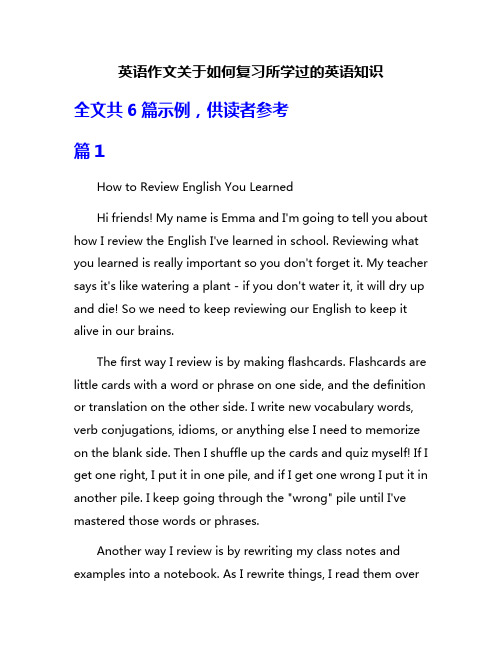
英语作文关于如何复习所学过的英语知识全文共6篇示例,供读者参考篇1How to Review English You LearnedHi friends! My name is Emma and I'm going to tell you about how I review the English I've learned in school. Reviewing what you learned is really important so you don't forget it. My teacher says it's like watering a plant - if you don't water it, it will dry up and die! So we need to keep reviewing our English to keep it alive in our brains.The first way I review is by making flashcards. Flashcards are little cards with a word or phrase on one side, and the definition or translation on the other side. I write new vocabulary words, verb conjugations, idioms, or anything else I need to memorize on the blank side. Then I shuffle up the cards and quiz myself! If I get one right, I put it in one pile, and if I get one wrong I put it in another pile. I keep going through the "wrong" pile until I've mastered those words or phrases.Another way I review is by rewriting my class notes and examples into a notebook. As I rewrite things, I read them overand over, which really helps them stick in my brain. Sometimes I'll decorate the pages with drawings about the topic to make it more fun. For example, if I'm reviewing animal vocabulary words, I'll draw little cartoon animals next to each word. Drawing pictures connected to what I'm studying is a great way for me to remember it better.My favorite way to review, though, is by teaching my stuffed animals! I'll grab my favorite teddy bear, Mr. Snuffles, and pretend he's a new student who doesn't know any English yet. I go through the vocabulary, grammar rules, conversational phrases, whatever I need to review, and teach it to Mr. Snuffles very slowly and clearly. I find that pretending to teach someone else helps me reallyunderstand the material myself. Sometimes I even give Mr. Snuffles little quizzes and tests to make sure he's learning!I also really like reviewing by watching fun videos or playing games about English topics. There are lots of great YouTube channels for kids learning English with animated videos, songs, skits and more. My favorites are the ones with characters going on adventures and telling stories. Games like hangman, bingo, or memory games are also awesome for reviewing vocab. If I'm feeling artistic, I'll make up a comic strip or story using newwords and phrases I've learned. Getting creative and having fun makes reviewing much more enjoyable.Of course, I still do more traditional methods of reviewing too, like reading back over my textbook chapters or doing practice worksheets. But I try to mix in the fun, creative ways I mentioned so reviewing doesn't get too boring. The most important things are to review a little bit every day, and to find ways to review that work best for how you learn.I hope these tips give you some good ideas for how to review your English! Consistent reviewing and practice is the key to getting really good at any language. It takes hard work, but it's so rewarding when you can understand and communicate more and more. Keep it up, study hard, and soon you'll be English masters! Thanks for reading, goodbye!篇2How to Review the English You Have LearnedHi friends! My name is Emily and I am going to tell you about how I review all the English I have learned in school. Reviewing what you have learned is super important so you don't forget everything over the summer holidays or long breaks from school. If you don't practice, it's really easy to forget vocabulary words,grammar rules, and all the other stuff you worked so hard to learn.The first thing I do to review is go through all my notebooks and handouts from English class. I reread my notes and examples we went over in class. I try to find the trickiest grammar points or longest vocabulary lists and spend extra time on those. If there are any doodles or drawings in my notebook, I look at those too because they help me remember what we were learning that day.Next, I quiz myself on vocabulary using flashcards or apps like Quizlet. I sort my flashcards into categories like animals, classroom objects, opposite adjectives, etc. I keep going through the stacks until I don't get any wrong. For words I'm really struggling with, I make up silly rhymes or sayings to help me remember the meaning. Like "You butter not tell a fib, that means to lie!"After vocabulary, I move on to grammar review. I make a list of all the grammar points we learned and then I come up with example sentences using each one. So for simple past tense verbs, I'll write "I walked to the park yesterday." For the future tense, I'll write "I will study hard for my test." I just keep making sentences until I feel really confident with that grammar rule.One of my favorite ways to review is to read children's books in English. The vocabulary and grammar is pretty simple, but it's great practice. It also really helps if you can find books you've already read in your native language. That way you already know the story, so you can focus just on the English. Books with lots of pictures are best because the images help explain what is happening.I also watch movies, shows and YouTube videos in English as another way to review. When I come across words or expressions I've forgotten, I'll go back and re-watch those partsOver and over until I've got them locked in my brain. Sometimes I'll even act out the scenes or repeat the lines along with the video to get extra practice. It's fun because I get to learn English while watching my favorite shows!Even though writing is hard, it's probably the best way to review everything - grammar, vocabulary, spelling, punctuation, and more. I usually start by writing super short and simple sentences about my day or my hobbies. Like "I am nine years old.I like to play football." Then I keep making the sentences longer and more complex as I regain confidence.Another writing activity I do is keep an English diary or journal. Each day I'll write down a few sentences or paragraphsabout whatever I did that day - what I ate, where I went, who I saw, etc. It's great because it combines reviewing grammar, expanding my vocabulary, and also just practicing getting my thoughts and experiences down on paper in English.When I'm feeling really motivated, I'll also write short stories or make up funny comic strips using my English skills. I can be as creative and silly as I want, which makes it much more fun than just doing grammar drills over and over. And of course, my family is always happy to be my audience and give me feedback!So those are my top tips for how to properly review all the English you've learned in school. It does take regular practice and effort, but it's so worth it when you can actually speak and understand this global language that's used all over the world. Plus, being bilingual or even multi-lingual just makes you a smarter, cooler person in general!The most important thing is to find the review activities that YOU find interesting and engaging. If you hate singing songs, then don't do that as your review method. If you'd rather eat a giant spider than read comic books, then don't read comic books! Experiment with different techniques and mix it up so you never get bored.Learning a language is challenging but also really fun and rewarding. As long as you keep reviewing what you've learned in creative ways that work for your learning style, you'll be speaking, reading and writing in English like a champ! Just remember, practice really does make perfect. So keep practicing, keep trying, and you'll be an English master in no time!篇3How to Review the English You've LearnedHi everyone! Today I want to talk about how to review and practice the English you've already learned in school. Reviewing is super important if you want to remember what you've studied. Otherwise, you might forget everything really fast!The first thing you need to do is make reviewing a habit. That means doing it regularly, like every day or every few days. It's much better to review a little bit frequently than to try cramming it all in right before a test. That never works very well!One really fun way to review is by playing games. You can play games by yourself, with your friends, or even with your parents or siblings. Here are some ideas for English review games:• Flashcard games - Write down vocabulary words on cards and quiz each other. You can play "Go Fish" or just take turns picking random cards.• Word scrambles - Scramble up the letters of a word and see who can unscramble it first.• Hangman - One person picks a word and draws lines for each letter. The other players guess letters until they get the full word or get hung!• Twenty Questions - Think of a vocabulary word and have your friend ask yes/no questions to try to guess what it is.Making the review into a game makes it much more enjoyable. You'll learn better when you're having fun!Another great review technique is reading. Find some simple books, comics, or magazine articles in English. As you read, make a list of any words you don't know. Look those words up and practice using them.For longer reading materials, try summarizing each paragraph or chapter in your own words when you finish it. Summarizing shows how well you understood the main ideas.You can also review by listening to things in English, like songs, videos, movies, or audiobooks. Listen carefully and see ifyou can understand most of what is being said and done. Sing or repeat lines from songs to practice pronunciation.To review writing, keep an English journal or diary. Write about your day, an interesting experience, or anything else you want. Having a journal lets you use vocabulary and grammar you've learned in your own sentences.Or you could write stories or make comic strips using words and phrases you need more practice with. Getting creative makes writing practice way more fun!Whenever you forget something or make a mistake while reviewing, don't get discouraged. Just write it down to study again later. Over time, reviewing regularly will make that knowledge stick in your brain.Lastly, be sure to ask your English teacher for other review activities or practice materials. They'll be happy you want to improve your English skills!Reviewing may not seem too exciting at first. But finding ways to make it engaging, like through games and fun projects, can make a huge difference. The more you review, the better you'll remember everything you've learned in English class. Justkeep practicing - your English will continue getting better and better!So those are my tips for how to review the English you've already studied. Make it a habit, keep it fun with games and activities, use different skills like reading and writing, and most importantly - review frequently! Let me know if you have any other great review tricks to share.篇4How to Review the English You LearnedHey there friends! It's me again, your pal who loves learning English. Today I want to share some tips with you on how to review and remember all the cool English stuff we've learned in class. It's super important to review what you've studied, or else you might forget it all! That would be such a bummer after working so hard.The first thing I like to do is make learning fun. Reviewing doesn't have to be boring or feel like more homework. You can turn it into games and activities you enjoy! One of my favorite ways to practice is by reading comic books or watching cartoons in English. I get to enjoy an awesome story while learning newwords and phrases. Listening to English songs and trying to sing along is another blast. I literally get to JAM out while learning!Sometimes I also like to make up rhymes, raps or silly sentences using the new vocabulary words. That helps me remember them way better than just staring at a list. Like for animals, I'll go "The furry bunny likes to run and the hungry monkey loves to munch a bunch of yummy bananas for lunch!" See, super goofy but it works!Of course, good old-fashioned flashcards are always a reliable way to study. You can decorate them with colourful doodles to make them more fun. Or you can quiz your family and friends to get them involved too. I sometimes make a game where if they get an answer right, they get a point. Whoever gets the most points wins a small prize! Pretty clever, right?Another thing that really helps me is using the English I've learned in real situations. I'll try to order something in English when my family goes out for food. Or I'll ask the store clerk a simple question in English when we're shopping. It's a little scary at first, but gets easier the more I practice. My parents are super proud of me when I use my English skills in the real world!Sometimes I get stumped though and need a lil' extra help. That's when I'll ask my English teacher for suggestions or watchinstructional videos online. There are so many awesome resources these days! I particularly love the ones that use songs, games and jokes to make the lessons entertaining.The absolute key thing though, is to review a little bit each day. That's way better than cramming a tonne of stuff all at once before a test. It's like when I'm training to run a race - I can't just do no exercise for weeks and then one super long workout right before the race. I need to train regularly in smaller chunks to get good endurance. It's the same with reviewing English!So those are my tips, straight from me to you! Make it fun, use games and activities, practice in real life, ask for help when needed, and review a little every single day. If you do all that, you'll be an English superstar in no time! We can learn this language together, just take it step-by-step. Never give up, keep working hard, and I know you'll get there!篇5How to Review What You Learned in English ClassHey there! My name is Timmy and I'm going to tell you all about the best ways to review the English you've learned in class. Reviewing is super important if you want to keep getting betterat English. It helps you remember vocabulary words, grammar rules, and all the other stuff your teacher went over.The first thing I like to do is go through my notebook from class. I read over my notes carefully and think about anything I didn't quite understand. I make a list of those things so I can ask my teacher to explain them again. The notebook is great for remembering new words we learned too. I like to make flashcards with the English word on one side and the meaning in my language on the other side. Then I quiz myself or have my parents quiz me.Speaking of parents, they can really help with reviewing English. My mom will ask me questions in English about my day or what I did over the weekend. I have to answer back in full sentences, using all the grammar rules I've learned. If I make a mistake, she corrects me gently. My dad likes to play explore imaginary situations, like "What would you do if you found a hundred dollars on the street?" I have to respond using lots of English vocabulary.Another really fun way to review is reading kids' books or comics in English. I can hear the words in my head as I read them. The pictures also give me clues about what's happening, so I can figure out trickier words. My favorites are the Dog Man andCaptain Underpants books - they're hilarious! Sometimes Ire-read the same book over and over until I'm totally comfortable with it. Reading out loud is good practice for pronunciation too.You know what else is awesome? Games! There are tons of cool online games and apps for practicing English. My teacher showed us one where you have to dress up an avatar, but you can only select the right clothes if you get the vocabulary word correct. Another fun one is English songs with lyrics you can follow. Music makes it easier to learn phrases and sentence patterns.Of course, you can't forget about watching movies and shows in English! Put on the subtitles in English too so you can read along. I'm obsessed with Pokemon right now, so I've been binge-watching all the episodes and movies. Hearing the characters talk really helps cement the vocabulary in my brain. Just don't spend too much time watching - you still have to do your homework!Finally, the most important thing is to keep practicing English as much as you can. I have a special English notebook where I try writing a few sentences every day about my life or something cool I learned. Even just fifteen minutes of practicereviewing vocab, grammar, reading, or watching a show makes a huge difference. The more you use those English skills, the better you'll get!So there you have it - my top tips for reviewing all the English you've covered in class. Do a little review every single day and I promise you'll see your skills improve like crazy. Just stay motivated and make it fun. English is an awesome language to learn, so enjoy the journey! Let me know if you have any other questions.篇6Here's an essay about how to review English knowledge you have learned, written in English with around 2,000 words, using a primary school student's tone:Hi there, friends! Today, I'm going to share with you some tips on how to review the English stuff you've learned in school. As you know, learning English can be super fun, but it's also important to review what you've learned so that you don't forget it!First things first, let's talk about vocabulary. You know, those words that sometimes feel like tongue twisters? Well, one great way to review vocab is by making flashcards. Grab some indexcards or even cut up pieces of paper, and write the English word on one side and the meaning on the other. You can even draw little pictures to help you remember! Then, you can shuffle the cards and quiz yourself or play games with your friends or family.Another fun way to review vocabulary is by creating your own word search puzzles or crossword puzzles. You can use online tools or even make them by hand. It's like a treasure hunt, but with words! Plus, you'll feel like a real puzzle master when you solve them.Now, let's move on to grammar. Grammar can be a bit tricky sometimes, but don't worry, there are ways to make it more enjoyable. One thing you can do is turn grammar rules into silly songs or raps. For example, you could sing about verb tenses or make up a catchy tune about subject-verb agreement. Not only will you be reviewing grammar, but you'll also be having a blast!Another great idea is to create grammar comic strips. Draw little characters and have them talk to each other, but make sure they use the grammar rules you're trying to review. You could have a superhero character who always uses proper sentence structure or a funny animal character who struggles with prepositions. Get creative and have fun with it!Moving on to reading and writing, a fantastic way to review these skills is by starting a pen pal exchange with someone from an English-speaking country. You could write letters or emails back and forth, sharing stories, jokes, or even book recommendations. Not only will you be practicing your writing, but you'll also be learning about a different culture!If you're more of a techie kid, you could start a blog or vlog (that's a video blog) where you write or talk about your favorite topics in English. You could review books, movies, or video games, or even share your thoughts on current events. The best part? You'll be building your English skills while doing something you love!Finally, let's not forget about speaking and listening. One great way to review these skills is by watching English movies, TV shows, or YouTube videos. But here's the twist: turn on the English subtitles or closed captions. That way, you'll be practicing your listening comprehension while also reinforcing your reading skills. Plus, you can pause and repeat any tricky lines or phrases until you've got them down.Another fun activity is to have conversation practice sessions with your friends or family members. Take turns being the "teacher" and ask each other questions or give prompts for theother person to respond to. You could even record yourselves and listen back to see how you're progressing.Well, there you have it, friends! Those are just a few ideas to help you review your English knowledge in a fun and engaging way. Remember, the more you practice, the better you'll become. So, grab those flashcards, start singing those grammar songs, and let's keep learning together!。
中考复习计划作文英文
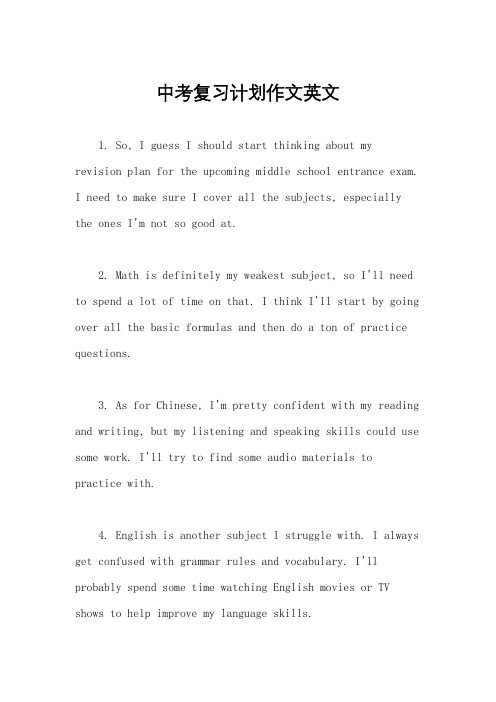
中考复习计划作文英文1. So, I guess I should start thinking about myrevision plan for the upcoming middle school entrance exam.I need to make sure I cover all the subjects, especially the ones I'm not so good at.2. Math is definitely my weakest subject, so I'll need to spend a lot of time on that. I think I'll start by going over all the basic formulas and then do a ton of practice questions.3. As for Chinese, I'm pretty confident with my reading and writing, but my listening and speaking skills could use some work. I'll try to find some audio materials topractice with.4. English is another subject I struggle with. I always get confused with grammar rules and vocabulary. I'll probably spend some time watching English movies or TV shows to help improve my language skills.5. Science and history are not too bad for me, but I still need to review all the important points and make sure I understand the key concepts.6. It's going to be a busy few months, but I know that if I stay organized and focused, I can definitely do well in the exam. I just need to stick to my revision plan and stay positive.。
高考英语作文活动类复习资料
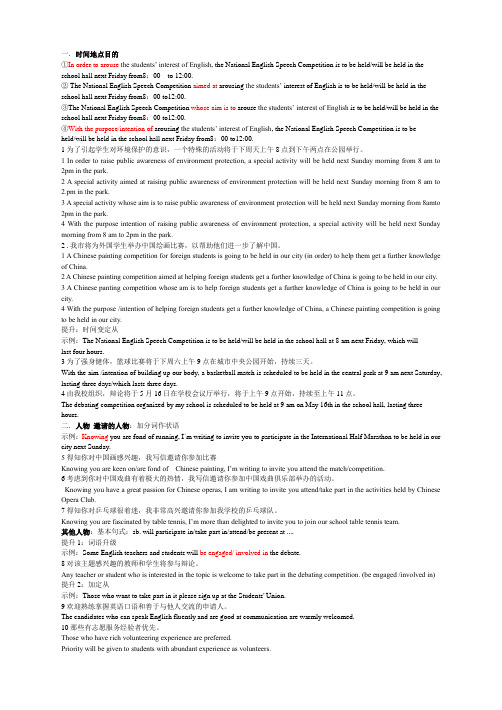
一.时间地点目的①In order to arouse the students’ interest of English, the National English Speech Competition is to be held/will be held in the school hall next Friday from8:00 to 12:00.② The National English Speech Competition aimed at arousing the students’ interest of English is to be held/will be held in the school hall next Friday from8:00 to12:00.③The National English Speech Competition whose aim is to arouse the students’ interest of English is to be held/will be held in the school hall next Friday from8:00 to12:00.④With the purpose/intention of arousing the students’ interest of English, the National English Speech Competition is to beheld/will be held in the school hall next Friday from8:00 to12:00.1 为了引起学生对环境保护的意识,一个特殊的活动将于下周天上午8 点到下午两点在公园举行。
1 In order to raise public awareness of environment protection, a special activity will be held next Sunday morning from 8 am to 2pm in the park.2 A special activity aimed at raising public awareness of environment protection will be held next Sunday morning from 8 am to2.pm in the park.3 A special activity whose aim is to raise public awareness of environment protection will be held next Sunday morning from 8amto 2pm in the park.4 With the purpose intention of raising public awareness of environment protection, a special activity will be held next Sunday morning from 8 am to 2pm in the park.2 . 我市将为外国学生举办中国绘画比赛,以帮助他们进一步了解中国。
英语作文关于如何复习所学过的知识
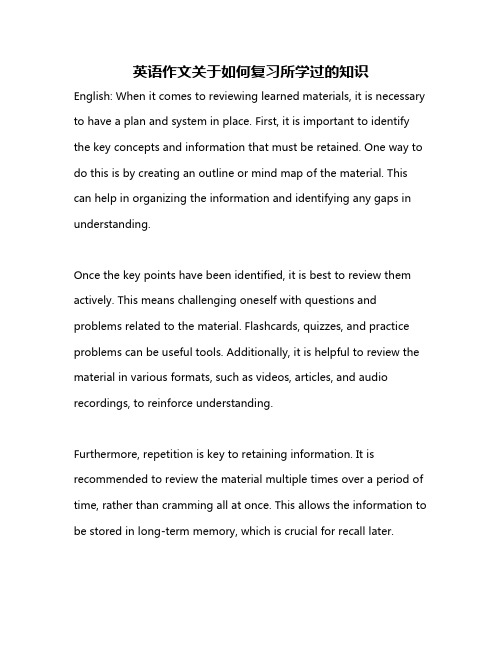
英语作文关于如何复习所学过的知识English: When it comes to reviewing learned materials, it is necessary to have a plan and system in place. First, it is important to identify the key concepts and information that must be retained. One way to do this is by creating an outline or mind map of the material. This can help in organizing the information and identifying any gaps in understanding.Once the key points have been identified, it is best to review them actively. This means challenging oneself with questions and problems related to the material. Flashcards, quizzes, and practice problems can be useful tools. Additionally, it is helpful to review the material in various formats, such as videos, articles, and audio recordings, to reinforce understanding.Furthermore, repetition is key to retaining information. It is recommended to review the material multiple times over a period of time, rather than cramming all at once. This allows the information to be stored in long-term memory, which is crucial for recall later.In order to stay motivated and engaged, it is important to take breaks and reward oneself for progress made. This can help prevent burnout and encourage consistent reviewing. Finally, seeking feedback from teachers, mentors, or classmates can provide valuable insight and aid in identifying areas for improvement.Overall, reviewing learned materials requires a plan, active engagement with the content, and repetition over time. Taking breaks, seeking feedback, and using various tools to reinforce understanding can also enhance the review process.中文翻译:在复习已经学习的知识时,有计划和体系是必要的。
有效复习所学知识英语作文
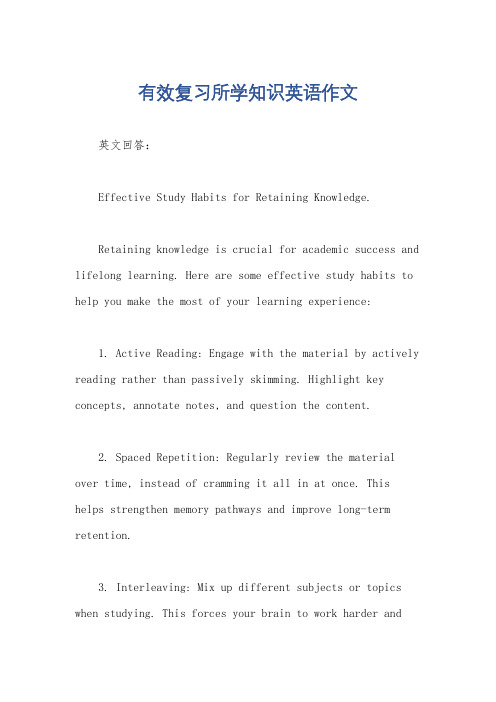
有效复习所学知识英语作文英文回答:Effective Study Habits for Retaining Knowledge.Retaining knowledge is crucial for academic success and lifelong learning. Here are some effective study habits to help you make the most of your learning experience:1. Active Reading: Engage with the material by actively reading rather than passively skimming. Highlight key concepts, annotate notes, and question the content.2. Spaced Repetition: Regularly review the material over time, instead of cramming it all in at once. This helps strengthen memory pathways and improve long-term retention.3. Interleaving: Mix up different subjects or topics when studying. This forces your brain to work harder andimproves understanding of the relationships betweendifferent concepts.4. Elaboration: Connect new information to existing knowledge and experiences. Explain concepts to yourself or others, which helps deepen understanding and improve recall.5. Testing Yourself: Regularly test yourself on the material using flashcards, practice problems, or self-quizzes. This identifies areas where you need more reinforcement and strengthens memory.6. Sleep: Ensure you get enough sleep, as it isessential for memory consolidation. Sleep allows your brain to process and store information effectively.7. Exercise: Regular exercise has been shown to improve cognitive function and enhance memory. Engage in physical activity before or after studying to boost learning.8. Mind Mapping: Create mind maps to visually organize and connect concepts. This helps improve understanding andmakes it easier to retrieve information later.9. Collaboration: Study with classmates or friends. Discuss concepts, share perspectives, and teach each other. Collaborative learning promotes understanding and improves retention.10. Metacognition: Regularly reflect on your study habits and identify areas for improvement. Adjust your strategies as needed to optimize your learning.中文回答:有效的复习习惯。
复习英语方法英语作文
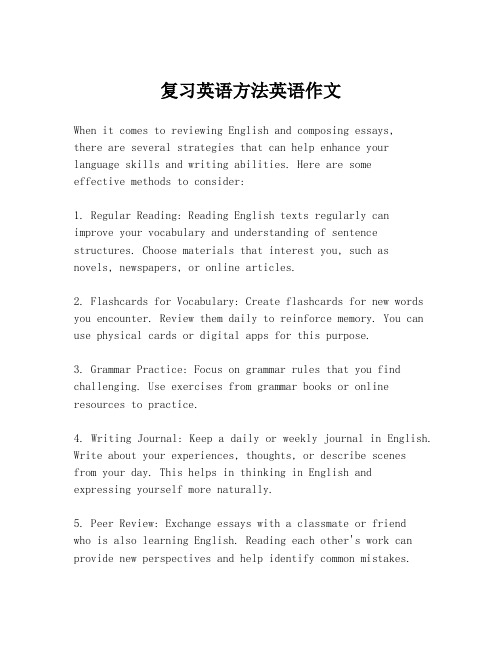
复习英语方法英语作文When it comes to reviewing English and composing essays,there are several strategies that can help enhance your language skills and writing abilities. Here are someeffective methods to consider:1. Regular Reading: Reading English texts regularly can improve your vocabulary and understanding of sentence structures. Choose materials that interest you, such as novels, newspapers, or online articles.2. Flashcards for Vocabulary: Create flashcards for new words you encounter. Review them daily to reinforce memory. You can use physical cards or digital apps for this purpose.3. Grammar Practice: Focus on grammar rules that you find challenging. Use exercises from grammar books or online resources to practice.4. Writing Journal: Keep a daily or weekly journal in English. Write about your experiences, thoughts, or describe scenesfrom your day. This helps in thinking in English and expressing yourself more naturally.5. Peer Review: Exchange essays with a classmate or friendwho is also learning English. Reading each other's work can provide new perspectives and help identify common mistakes.6. Model Essays: Study well-written essays to understand how they are structured. Pay attention to the introduction, body paragraphs, and conclusion. Try to emulate the style and flow in your own writing.7. Expanding Sentences: Practice taking a simple sentence and expanding it with adjectives, adverbs, and complex structures. This can make your writing more detailed and interesting.8. Thesaurus Use: Learn synonyms for common words to enrich your vocabulary. However, be cautious not to use overly complex words that might confuse the meaning.9. Outlining: Before you start an essay, create an outline. This will help you organize your thoughts and maintain alogical flow throughout the essay.10. Proofreading: Always proofread your work. Look forspelling mistakes, grammatical errors, and awkward phrasing.It's helpful to take a break and then come back to your essay with fresh eyes.11. Using Technology: Utilize language learning apps andonline tools that can correct your grammar and suggest improvements in your writing.12. Writing Prompts: Use writing prompts to practicedifferent essay types, such as argumentative, narrative, or descriptive essays. This variety will prepare you for various writing situations.13. Timed Writing: Practice writing under a time constraint to simulate exam conditions. This can help you manage your time effectively and think quickly.14. Feedback: Seek feedback from teachers or tutors. Constructive criticism is invaluable for improvement.15. Consistency: Consistency is key in language learning. Make a schedule and stick to it, ensuring you dedicate time each day to practice.By incorporating these methods into your study routine, you can significantly improve your English proficiency and essay writing skills. Remember, progress takes time, so be patient and persistent in your efforts.。
2023年中考英语作文复习满分范文6篇课件

forward to your reply.
Yours,
Li Hua
★ 范文
Dear Tom, I am glad to receive your e-mail. Let me introduce my favorite
4.In short, the Mid- Auturnn Festival is a special day of pleasure and happiness.简而言之,中秋节是一 个充满快乐和幸福的特殊日子。 (运用了高级词汇 in short 来过渡总结节日的感 受和意义。)
5.I hope that my letter will help you know more
★ 范文
Hello, everyone! We had a sharing session on “My progress” last month. Here is what we shared in our group.
There are four members in our group, Fang Fang, Sun Lei, Zhao Yun and me. Fang Fang has spent most of her time studying in her free time. Therefore, she gradually forms good learning habits right now. Sun Lei has taken part in various kinds of voluntary work. It is such a good chance for her to help others in need. And making a difference to the world is meaningful to her. As an old saying goes, roses in your hand, flavor in mine. Zhao Yun has spared no effort to join some clubs which aim at protecting the environment. He feels so proud of himself that he can do something to help protect the environment such as recycling old things, picking up rubbish in the park , cleaning the streets and so on, which gives him a great sense of achievement.As for me, I have improved a lot in learning the traditional art like paper cutting and trying my best to keep Chinese traditional art form alive.
- 1、下载文档前请自行甄别文档内容的完整性,平台不提供额外的编辑、内容补充、找答案等附加服务。
- 2、"仅部分预览"的文档,不可在线预览部分如存在完整性等问题,可反馈申请退款(可完整预览的文档不适用该条件!)。
- 3、如文档侵犯您的权益,请联系客服反馈,我们会尽快为您处理(人工客服工作时间:9:00-18:30)。
英语作文话题词汇精选/作文模板话题一:爱好与兴趣spare time (业余时间), favorite (最喜欢的), interest(兴趣), hobby(爱好), appetite(嗜好),taste(口味), read novels(也小说), play football/basketball(打足球/篮球), surf the internet(上网), chat online(在线聊天), play games(玩游戏), collect stamps(集邮), make e-friends(交网友), climb mountains(爬山), watch TV (看电视), enjoy popular music(喜欢流行音乐),be interested in(对…感兴趣), develop an interest in(在…方面发展兴趣), be fond of(喜欢…),be keen on(喜欢…), have love for(喜爱…), have a taste in(对…有兴趣) 等。
话题二:劳动与劳动观念work(工作), be at work(在工作), work hard(努力工作), produce(生产), worker(工人), labor force(劳动力), labor(劳动), voluntary labor(义务劳动),serve the people(为人民服务),heart and soul(全心全意),physical labor(体力劳动), mental labor(脑力劳动), labor viewpoint(劳动观念), labor day(劳动节), workday(工作日), means of labor(劳动方式), honorable(光荣的), be devoted to(奉献于..), value(价值), earn money(赚钱) , personal interests(个人利益)等。
话题三:创建和谐社会harmonious(和谐的), friendly(友好的), civilized(文明的), honest(真诚的), credible (诚信的), be public-spirited(有公德心的), balanced(平衡的), be in order(有序的), peaceful(和平的), live in harmony(生活和谐), sustainable development(可持续发展)等,help each ether(互助), care for each other(互相关心), have deep love for (热爱), be concerned with (关心), build(创建), cherish(珍惜), take an active part in(积极参与), pay attention to social moral(讲究社会公德), protect the environment(保护环境), save energy(节省能源)等。
no pains, no gains. 不劳无获。
…can be achieved by hard wok. …可以通过劳动获得。
it is difficult to find work in the present situation. 在当前形势下,很难找到工作。
it is honorable to ……是光荣的。
if everyone …for others and the society, our world will be …如果每个人为他人和社会做…,我们这个世界将会…。
every one should …and devotes himself to building our motherland into a strong country.每个人应该…,为把我们祖国建设成为一个强壮的国家而奉献自己的力量。
话题四:招聘与求职employ(雇佣), look for(寻找), take in(吸纳), full-time(全职的), part-time(兼职的), well-paid(薪水高的), be paid by the hour(按小时发工资), requirement(要求), résumé(个人履历),schooling(受教育情况), subjects(课程), working experience(工作经历), qualification(合格证明), transcript (成绩单), health(健康状况), present address(现在通讯地址)等,apply for(申请…), graduate from(毕业于), major in(以…为专业), degree(学位), scholarship(奖学金), good grades(良好的成绩), hobby(爱好), favorite(最喜欢的), be skilled in(在…方面熟练), be good at(擅长…), experienced(有经验的), confident(自信的), English and computer ability(英语和计算机能力), healthy(健康的)等。
话题五:健康问题physical and mental condition(身体与精神状态), strong(强壮的), un/healthy(不健康/健康的), overweight/fat(肥胖的), thin(瘦的), near/short-sighted(近视的), mentally unhealthy(精神不健全的), normal(正常的), abnormal(不正常的), energetic(精力旺盛的), unhealthy eating habit(不健康的饮食习惯), eat much junk food (吃太多的垃圾食品)等,stay/keep healthy/fit(保持健康), build up one’s body/ improve one’s’health(强身健体), enough sleep(充足的睡眠), take regular exercise(进行有规律的运动), roperdiet(合理的饮食), good living habits(良好的生活习惯), lose weight(减肥), remove heavy burdens(减轻负担), be good for/do good to(对…有益处), nutrition(营养), go on diet(节食), form a …eating habit(养成一个…的饮食习惯) breathe in as much fresh air等。
话题六:环境保护pollute(污染),waste is scattering here and there.(到处撒满了废弃物),protect the environment(保护环境) ,send out smoke and poisonous gases into the air(散发出烟和有毒气体),cut down trees(砍伐树木),pour waste water into the rivers(把废水注入河流),it is a shame to throw rubbish around. (乱扔垃圾是可耻的),form good habits to protect the surroundings(养成良好的习惯来保护环境),take active measures to protect rare animals(采取积极措施保护稀有动物),take good care of our forests(关心我们的森林),plant more trees to improve the environment (多植来改善环境),the terrible pollution have done great harm to us as well as to the surroundings. (可怕的污染已经给我们自己还有我们的环境带来了很大的危害。
)话题七:校园文明与安全问题school rules and regulations(学校规章制度),obey(遵守),observe(遵守), keep/observe discipline(遵守纪律), behave well(表现良好),be neatly dressed(穿戴整洁), respect one’s teachers and parents(尊敬师长), be on time(准时), keep the environment clean(保持环境干净), civilized(文明的) break the rules(违反规章制度), discipline(纪律), spit(吐痰), throw rubbish everywhere(乱扔垃圾), cheat in the exam(考试作弊), get in line (插队), fight with sb.(与…打架), punish sb. for (因…处罚某人)等。
the students are told not to break any of the rules of the school. 学校要求学生不要违反任何规章制度。
the students are expected to …学校期望学生…。
it must be made clear that the students should …必须明确的一点是,学生应该…。
…is of no good to a friendly and harmonious society. …对创建友好和谐的社会是毫无益处的。
it is honorable to obey the principles and rules of our school.遵守学校的规章制度是光荣的。
it is worthy of praise to ... …是值得表扬的。
it is shameful to ……是可耻的。
what we should do is that …我们应该做的事情是…话题八:友谊get to know sb.(认识某人), know sb. really well(熟知某人), make friends with sb.(和某人交朋友), a strongpersonality (一个很强的个性), personal matters(隐私), friendship(友谊), friendly(友好的), a close friend(一个亲密的朋友), trust each other (相互信任), precious(珍贵的), worthy(有价值的), understanding(通情达理的), share …with sb.(与…分享…), be loyal to(对…忠诚), keep in touch with sb. (与…保持联系), keep company with sb.(和…结交), stay best friends with sb. (和…保持很好的友谊)等。
